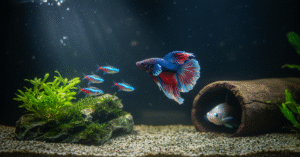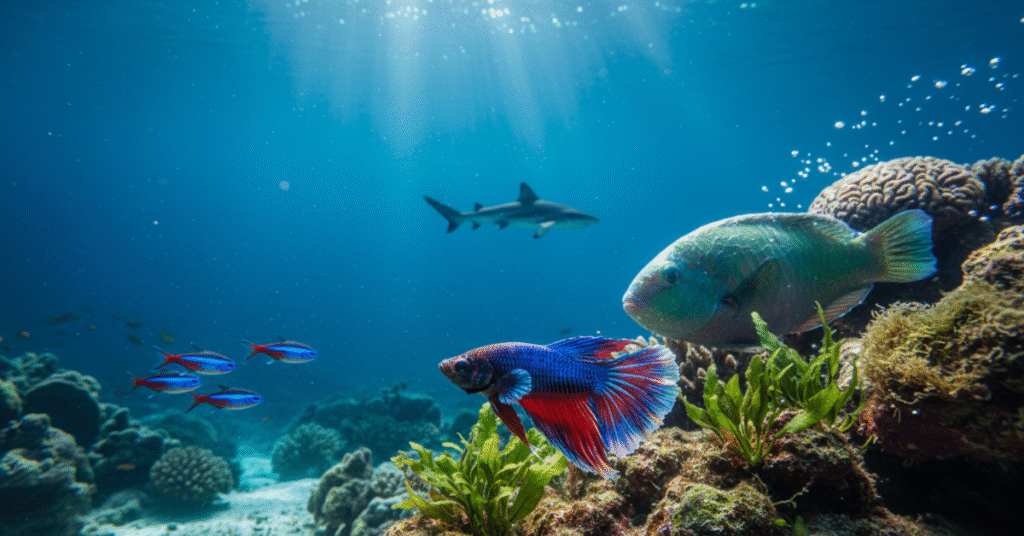As someone who loves exploring the hidden realities of our world for FACTOVATE, I often come across questions that seem simple but hide a fascinating complexity. One such question that has always intrigued me is about the mysterious lives of our aquatic friends: Do fish really sleep?
If you have an aquarium at home, you might have spent hours watching your fish—swimming, feeding, and occasionally just hovering motionlessly. You never see them close their eyes like your cat or dog does, so it’s easy to assume they don’t sleep at all. This popular belief is one of the most common myths about marine life. However, science reveals a different, much more interesting story.
Why the Myth Exists: No Eyelids!
The main reason people doubt the sleeping habits of fish comes down to one simple anatomical fact: Fish do not have eyelids.
We associate sleep with closing our eyes, a physical signal that we are resting and blocking out light. But since fish lack these protective membranes, they literally sleep with their eyes open. Imagine trying to fall asleep while staring directly at the ceiling! Because of this constant ‘staring,’ it looks like they are always alert and awake, leading many to wonder, do fish really sleep or are they just resting?
The truth is, they absolutely need sleep, or at least a state very much like it, for survival and health.
The Science of Sleep: It’s Not Just About Zzz’s
When scientists and marine biologists ask, do fish really sleep? they aren’t looking for a fish with a tiny pillow. They look for behavioral changes that indicate a state of reduced activity and awareness, which is what sleep fundamentally is:
- Reduced Metabolism: A drop in the fish’s metabolic rate, meaning their bodily processes slow down.
- Immobility/Resting Posture: The fish will often hold a resting posture, usually remaining motionless near the bottom, in plants, or inside protective structures like coral. They will stop actively swimming.
- Decreased Responsiveness: They become much slower to respond to external stimuli, like light or noise. If you approach a fish in this state, it will take longer to react than if it were fully awake.
This state is technically called torpor or resting, but for all practical purposes and human understanding, it is the equivalent of sleep. Like all animals, fish need this period of downtime to conserve energy, repair tissues, and consolidate memories. So, when people ask, do fish really sleep, the scientific answer is a resounding yes, even if it doesn’t look like our kind of sleep.

Different Species, Different Sleeping Styles
Not all fish sleep the same way. Their resting habits are dictated by their environment and their position in the food chain:
- Parrotfish: These fascinating creatures secrete a protective mucous cocoon around themselves before resting. They effectively put up a ‘tent’ to mask their scent from predators while they rest.
- Sharks: Some species of shark, who are obligate ram ventilators (meaning they need to keep swimming to pass water over their gills), never truly stop moving. Instead, they enter periods of “active rest,” where they rely on currents and only one side of their brain rests at a time.
- Aquarium Fish (e.g., Goldfish): If you keep fish, you might have noticed them just floating in one spot near the tank bottom or hovering behind an ornament at night. This is often their form of rest.
My personal experience with maintaining an aquarium for many years confirms this. If you turn on a light suddenly during the night, they remain groggy and slow for a few seconds before zooming off. They are clearly transitioning out of a deep resting phase. It definitively answers the question, do fish really sleep—they just do it with their lights on!
A Final Fact on Fish Sleep
The misconception that fish never sleep largely ignores the fundamental biological needs of living organisms. Every creature needs a period of rest to function optimally. While they might not be dreaming about swimming with fins (a fun thought!), their period of torpor is essential for energy conservation and nervous system maintenance.
So the next time you look into a fish tank and see a motionless fish with wide-open eyes, know that it’s not staring at you suspiciously. It’s simply taking a necessary nap, entirely unaware of our human tradition of eyelids and pillows. This complex biological need confirms that do fish really sleep is not a question of ‘if,’ but ‘how.’ They rest, recharge, and remain vigilant all at the same time—a true wonder of nature.






